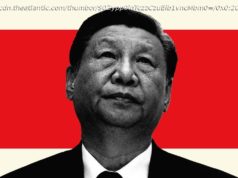The mainland authorities have never leveled that charge against someone from Taiwan before, and his formal arrest adds a new strain to tensions between Beijing and Taipei.
TAIPEI, Taiwan — Lee Ming-cheh, a human rights advocate from Taiwan who was detained in China in March, has been formally arrested on a charge of “subverting state power, ” the Chinese government has announced, amid a continuing crackdown on civil society organizations.
His arrest, announced on Friday, marks the first time the Chinese authorities have charged someone from Taiwan with subversion. Many people in Taiwan fear it will not be the last, and it has added a new strain to the tensions between Beijing and Taipei.
China ’s ruling Communist Party has never administered Taiwan but claims it as Chinese territory, to be annexed by force if necessary. The Nationalists who once dominated China fled to the island after losing to the Communists in a civil war in 1949. Today more residents of Taiwan identify themselves as Taiwanese than Chinese, and few support unification with China.
The rift between the two sides has widened since last year, when Tsai Ing-wen was elected president of Taiwan. The Democratic Progressive Party, led by Ms. Tsai, has historically favored formal independence from China.
Beijing broke off official communications with Taiwan after Ms. Tsai, in her inauguration speech, declined to yield to Chinese demands that she endorse a political formula that holds that Taiwan is part of “One China” that includes both mainland China and Taiwan.
Mr. Lee was detained on March 19 after crossing into mainland China from Macau, a former Portuguese colony that has limited autonomy from Beijing. Since then he has been held incommunicado, denied family visits and access to lawyers.
In the announcement of Mr. Lee’s arrest, An Fengshan, a spokesman for China’s Taiwan Affairs Office, said Mr. Lee visited China frequently over the past five years and “colluded with relevant individuals in the mainland, laying down an operational program, establishing an illegal organization and planning and implementing activities to subvert state power.” Mr. An offered no evidence to support these claims.
The Chinese government has in recent years increasingly used the crimes of “subversion” or “inciting subversion” to imprison political dissidents and human rights advocates. Chinese courts come under Communist Party control and rarely reject the prosecution’s case, especially in politically charged trials. Defendants found guilty of subversion can face up to life in prison, although shorter sentences are more common.
Last year, Peter Dahlin, a Swedish man living in Beijing who helped train Chinese legal advocates to challenge government decisions, was detained in secrecy and then expelled after he was made to confess on television .
Mr. An said that Mr. Lee and his Chinese associates had “candidly confessed” to the allegations. He did not give any details.
People close to Mr. Lee said that he sympathized with China’s beleaguered democracy movement and, before his detention, spoke weekly with Chinese contacts via the social media app WeChat about Taiwan’s experiences with democratization. They also said he had donated money and books to relatives of Chinese rights lawyers who had been imprisoned on the same charges he now faced.
Mr. Lee worked as a manager at a community college in Taipei and was a volunteer for Covenants Watch, an alliance of human rights organizations in Taiwan. Previously, he also worked in the Democratic Progressive Party.
The Democratic Progressive Party issued a statement on Saturday criticizing China for not making public any evidence of Mr. Lee’s purported crimes and for not formally notifying the Taiwan government of his detention. China’s opaque handling of Mr. Lee’s case was “certain to produce a chilling effect on the Taiwanese people” and had already “hurt the international image of the Chinese mainland, ” the party said.
China’s handling of Mr. Lee has added to the frosty relations across the Taiwan Strait. Beijing did not acknowledge his detention until 10 days after his disappearance. Last month, China barred Mr. Lee’s wife, Lee Ching-yu, from flying to Beijing to inquire about him.
In addition to trying to fly to China, Ms. Lee has publicly campaigned to free her husband, holding numerous news conferences and, last week, testifying before a United States House of Representatives committee about her husband’s plight.
Eeling Chiu, secretary general of the Taiwan Association for Human Rights, said that China’s treatment of Mr. Lee was likely to lead nonprofit workers from Taiwan — many of whom were engaged in less politically sensitive areas such as environmental protection — to question whether it was safe for them to operate in the mainland.
“I’ m afraid that this is going to result in serious concerns for a lot of people who go over to China, ” Ms. Chiu said in an interview.
Chinese state news outlets have marshaled mainland Chinese academics to reject the criticisms from Taiwan, endorse the government’s handling of Mr. Lee and argue that other people visiting the mainland from Taiwan need not fear arrest — so long as they obey the laws.
“The evidence of Lee Ming-cheh’s suspected crimes is abundant, ” Xinhua, the Chinese state news agency, said on Saturday, citing Chinese scholars. “The mainland’s handling of this shows laws must be followed, laws rigorously enforced and lawbreaking punished.”






